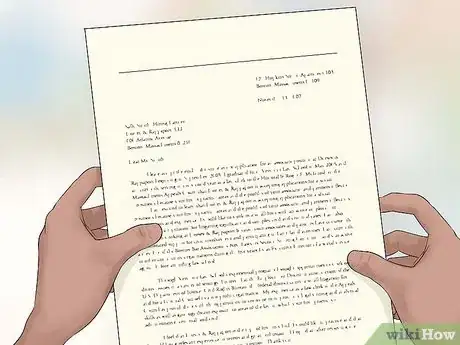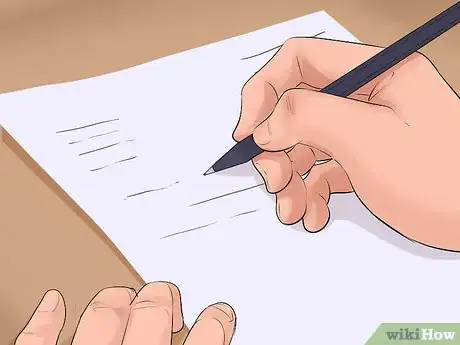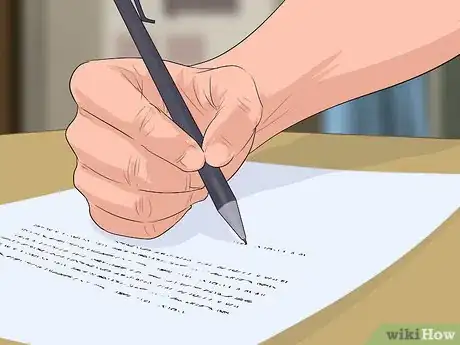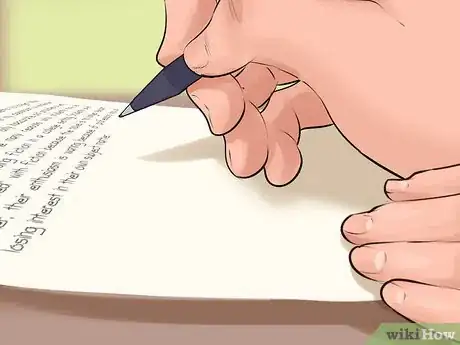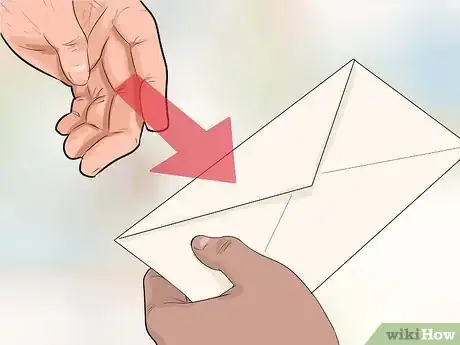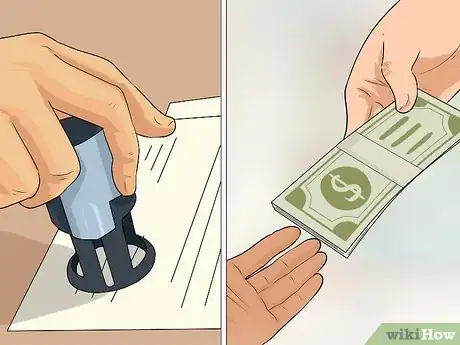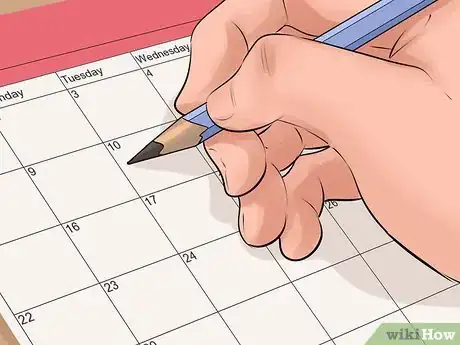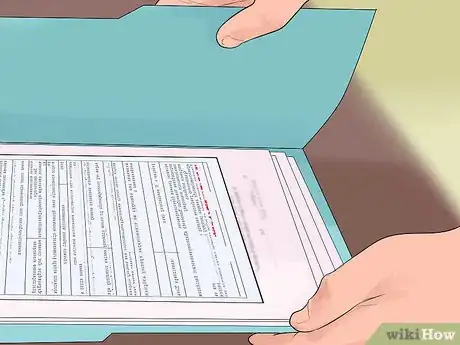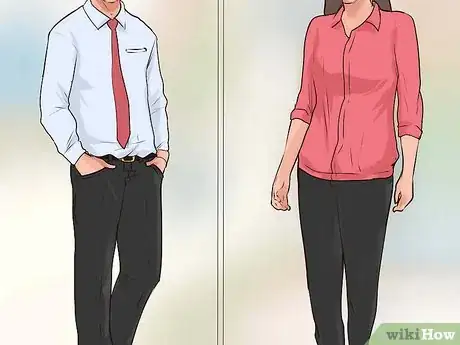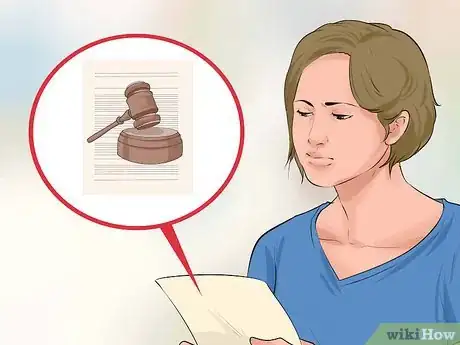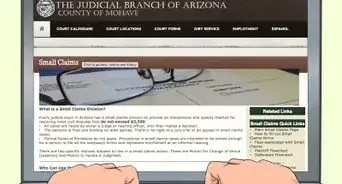This article was co-authored by Lahaina Araneta, JD. Lahaina Araneta, Esq. is an Immigration Attorney for Orange County, California with over 6 years of experience. She received her JD from Loyola Law School in 2012. In law school, she participated in the immigrant justice practicum and served as a volunteer with several nonprofit agencies.
There are 13 references cited in this article, which can be found at the bottom of the page.
This article has been viewed 29,349 times.
When a landlord believes that you have violated a lease, they should notify you of the violation by serving a notice on you. You can defend against the lease violation claim by documenting that you didn’t violate the lease and trying to talk with your landlord. If your landlord won’t listen to you, then you will probably have to defend yourself from an eviction lawsuit.
Steps
Negotiating with Your Landlord
-
1Read your “Cure or Quit” notice. Depending on the jurisdiction, the landlord may be legally required to give you this notice before filing an eviction suit. It will tell you what lease provision you have violated. The notice also typically gives you a certain amount of time to fix (“cure”) the problem. If you don’t fix the problem by the deadline, then the landlord will terminate your lease.[1]
- Read the notice to find out what term of the lease you are alleged to have violated. For example, leases often require that you not have pets, not use grills outside or on the stairwell, and use common areas reasonably.
- If you failed to pay rent, then you should receive a “Pay or Quit” notice. You must pay all of the owed rent before the deadline.
-
2Document that you haven’t violated the lease. The landlord might have wrongly accused you of violating the lease. For example, if you live in an apartment building, then someone else in the building might have committed the lease violation.
- Get letters or emails from your neighbors. For example, your landlord might accuse you of having a pet. You can get neighbors to write that it isn’t you with the pet.
- Take pictures. If you are accused of damaging your apartment, then take pictures or video to document the lack of damage. These pictures will be useful if you are later sued and have to defend yourself in court.
Advertisement -
3Write a letter to your landlord. You should gather your proof that you haven’t violated the lease and write a letter to your landlord disputing the allegations. You can include your proof and ask the landlord to call you with questions.
- Set the letter up like a professional business letter. Keep your tone formal but friendly.
- You could write, “Dear Mr. Smith. I received your Notice to Cure or Quit yesterday. According to the notice, you believe that I have violated our lease agreement because I am keeping a pet. I do not have a pet. Instead, the new tenants in the apartment beside me have a dog. I have included an email from Mrs. Tyler, who lives upstairs, testifying that my neighbors have the dog, not me. I would be happy to discuss this issue with you further.”
- You can send the letter via Certified Mail, or even send it via email, particularly if you can show that you have previously communicated with your landlord via email.
-
4Follow up with a personal conversation. Negotiation works best when you can talk in person, so that you can gauge how someone is responding to what you say. You can often resolve a dispute quickly in person.
- The key to discussing the alleged violation is to keep your cool. You shouldn’t mimic your landlord’s behavior.[2] Instead, listen closely to what they say.
- Firmly point out that you haven’t violated the lease. For example, you could say, “I didn’t trash the common area last Friday because I was staying with a friend that evening. I can give you her phone number, if you want to confirm that.”
-
5Mediate the dispute. If you have been a good tenant, always on-time with the rent, then the landlord might not want to lose you. In this situation, your landlord might be willing to mediate the dispute so that you can come to a resolution that works for both of you.
- In mediation, the mediator listens to both sides and helps guide you toward solutions you can agree on. Mediation is a good way to maintain the landlord-tenant relationship, so you should consider mediation if you definitely don’t want to move.
- You can find mediators through your courthouse or by contacting your local/state bar association. Ask for a referral.[3]
-
6Cure the problem, if necessary. You might have no choice but to fix the problem. If you really did violate the lease and don’t want to move out, then your best option might be to cure before the deadline stated on your notice.
- Let your landlord know as soon as possible that you have fixed the violation and that you intend to stay in your apartment.
Responding to an Eviction Lawsuit
-
1Read your landlord’s complaint. If you don’t voluntarily leave, then your landlord cannot throw you out. Instead, they must file an “unlawful detainer” action, which is a lawsuit in court. You will receive a copy of the complaint filed, along with a “summons.”[4]
- The summons should tell you the deadline for responding to the lawsuit. Make careful note of this date.
-
2Document any landlord self-help. It is illegal for your landlord to try and evict you themselves. Instead, they must file a lawsuit and get a court order to evict you. If your landlord tries to evict you, then you should document the action your landlord took. For example, your landlord cannot:[5]
- Change the locks.
- Throw you or your belongings onto the sidewalk.
- Threaten to physically remove you or your belongings.
- Order you to leave.
- Cut off the utilities to your apartment.
-
3Draft your response. You will respond to the lawsuit by filing an “answer” with the court. In the answer, you respond to each allegation made by your landlord and raise defenses. Your court should have printed “fill in the blank” forms you can use.[6] Stop into court and ask.
- Alternately, many local legal aid organizations might provide printed answer forms.[7]
-
4Raise your defenses. There are several defenses you could raise depending on the circumstances. Make sure you have evidence supporting a defense before raising it. Common defenses include:[8] [9]
- Insufficient notice. Some states require that the notice contain certain language or give you a certain amount of time to cure. If your landlord didn’t follow the law, then you can raise this as a defense.
- Self-help. If your landlord tried to evict you using self-help, then you should raise that as a defense.
- Retaliatory eviction. You can’t be evicted because you complained to your local or state government about the conditions of your apartment building. For example, if you complain that insufficient heat is provided, then your landlord can’t turn around and try to evict you.
- Housing discrimination. It is illegal under federal and state law to discriminate against you on the basis of certain protected characteristics—race, color, sex, religion, national origin, disability, and familial status.[10]
-
5Serve a copy of your response on your landlord. Make sure to give your landlord a copy of your answer ahead of the court hearing date. You should arrange to have it served before you file your answer.[11]
- Generally, you can hire someone to deliver the answer to your landlord, or you could ask someone 18 or older, who is not involved in the lawsuit, to deliver your answer for you.
- In some courts, you can also mail your answer. Read your court’s rules of procedure to find acceptable methods of service.
-
6File your response or a countersuit with the court. Once you have completed your answer, you should make several copies. Keep one copy and take the other copies and the original to the court clerk. Ask to file the original. Alternatively, you can file a countersuit in cases of discrimination or retaliatory eviction.
- You shouldn’t have to pay a fee to file your response, although this might vary by court.
Going to Court
-
1Note the hearing date. The petition might have stated the hearing date, or you might receive the date in the mail. Make a note on your calendar to show up for your hearing. You can’t skip the hearing.[12] If you miss it, then the court might enter judgment against you.
-
2Get witnesses and helpful documents. At the hearing, you need to explain to the judge why you shouldn’t be evicted. Make sure to identify witnesses who have helpful information, as well as any helpful documents.[13] For example, you should look for the following:
- If the notice was insufficient, then bring a copy of the notice. The judge will want to see it.
- If the landlord used self-help, then get a copy of the police report (if you called the police) as well as statements from witnesses who saw your landlord remove your things. You can also testify on your behalf.
- If you think your landlord is retaliating against you, then you should get a copy of your complaint to the health and safety department you complained to, as well as any report issued.
- If your landlord illegally discriminated against you, then get witnesses who observed your landlord’s biased behavior.
-
3Dress professionally. You want to make a good impression on the judge. For this reason, you should look your best. If you show up to court in messy clothes, then you signal to the judge that you are not a diligent, trustworthy person.
- Men should wear business casual clothes, at a minimum. This means dress pants, a button-up dress shirt, and a tie. Also wear dress shoes (not sneakers) and dark-colored socks.
- Women can wear dress slacks or skirts, along with a nice sweater or blouse. Women can also wear conservative dresses. It is most important that clothing not be too revealing or tight.
- Under no circumstances should men or women wear shorts, blue jeans, flip flops, hats, or T-shirts.[14] If you don’t have a lot of money, then go to a thrift store and find clothes in good condition.
-
4Listen to your landlord. At the hearing, your landlord will present their side of the story first.[15] You should listen quietly as he or she presents evidence to the judge. Be sure to take notes. Write down anything your landlord or a witness says that you want to respond to.
- Don’t raise your hand and ask the judge to speak. You will have a turn to speak. Stand quietly and listen.
- Try not to show emotion. Don’t shake your head, grimace, or make noises, no matter how inaccurate the testimony is.
-
5Present your side of the argument. You will be able to go second. Be sure to explain in more detail the reasons you stated in your answer for why you shouldn’t be evicted.[16] Offer to show the judge supporting documents. If a witness has helpful testimony, tell the judge your witness is with you to testify.
- The judge could ask you questions. Always answer honestly and say, “I don’t know” if you don’t know something.
-
6Receive the judge’s decision. After hearing the evidence, the judge should issue a decision. If you lose, then you have a limited amount of time to move out of your apartment.
- However, you might be able to appeal.[17] You can bring an appeal to a higher court and ask that the judgment against you be set aside because the judge made a serious error.
- Before filing your Notice of Appeal, you should talk with a lawyer about whether an appeal is worthwhile. It might be in your interest simply to move out.
References
- ↑ http://www.nolo.com/legal-encyclopedia/evictions-renters-tenants-rights-29824.html
- ↑ https://hbr.org/2014/06/how-to-negotiate-with-someone-more-powerful-than-you
- ↑ http://www.cookcountycourt.org/ABOUTTHECOURT/CountyDepartment/LawDivision/CourtAnnexedCivilMediation/MediatorList.aspx
- ↑ http://ptla.org/what-can-i-do-if-my-landlord-trying-evict-me#
- ↑ http://realestate.findlaw.com/landlord-tenant-law/illegal-evictions-can-get-you-in-trouble-for-landlord-harassment.html
- ↑ http://www.courts.ca.gov/documents/ud105.pdf
- ↑ http://www.masslegalhelp.org/housing/legaltactics1/answer-how-to-defend-your-eviction-case.pdf
- ↑ http://realestate.findlaw.com/landlord-tenant-law/defenses-to-eviction.html
- ↑ http://www.nolo.com/legal-encyclopedia/tenant-defenses-evictions-new-york.html
- ↑ http://civilrights.findlaw.com/discrimination/understanding-your-rights-housing-discrimination.html
- ↑ http://ptla.org/what-can-i-do-if-my-landlord-trying-evict-me#
- ↑ http://ptla.org/what-can-i-do-if-my-landlord-trying-evict-me#
- ↑ http://ptla.org/what-can-i-do-if-my-landlord-trying-evict-me#
- ↑ https://www.cohenjaffe.com/resources/what-to-wear/
- ↑ http://ptla.org/what-can-i-do-if-my-landlord-trying-evict-me#
- ↑ http://ptla.org/what-can-i-do-if-my-landlord-trying-evict-me#
- ↑ http://ptla.org/what-can-i-do-if-my-landlord-trying-evict-me#
- ↑ http://www.lsc.gov/

